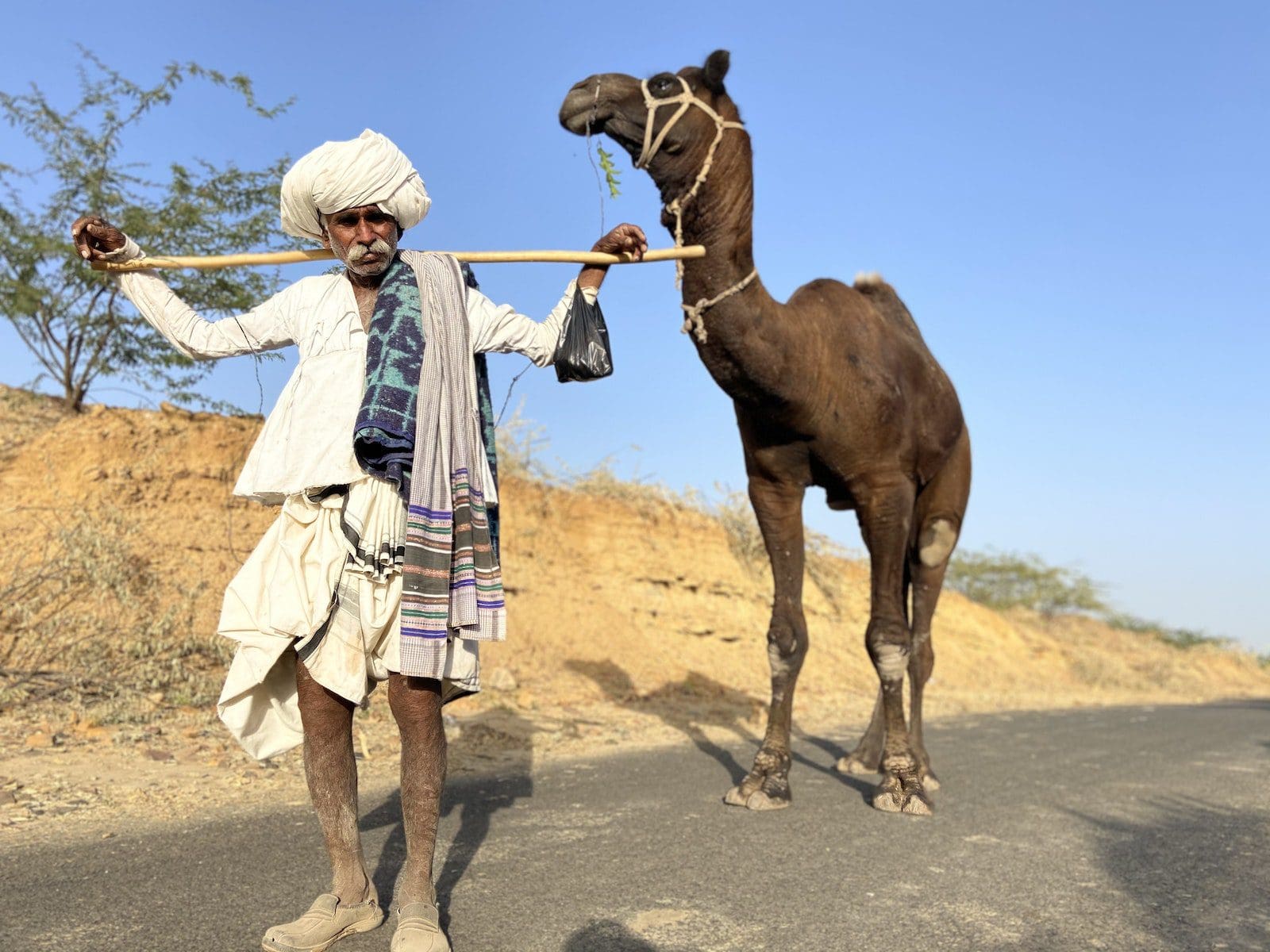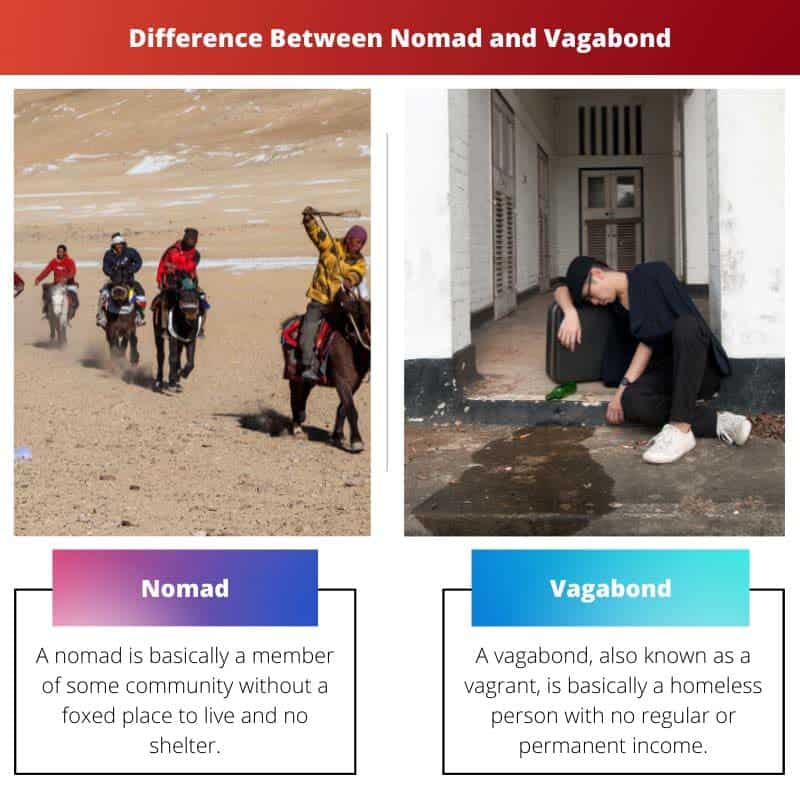Nomad and vagabond are both wanders who are basically a person who has no fixed or permanent place to live. Both nomads and vagabonds are sort of on a trip to nowhere and are always moving from one place to another with no fixed destination.
A vagabond is more of a person who is on a trip somewhere but without a defined period of time for the trip. They have more than one destination with no specific time length. A nomad is a person who is always wandering from one place to another and has no fixed place of residence.
Key Takeaways
- A nomad refers to a person who moves from place to place in search of food and shelter, while a vagabond is a person who travels from place to place for personal reasons, without a permanent home.
- Nomads follow a traditional lifestyle and strongly connect to their culture, while vagabonds may not have a specific culture or community they identify with.
- Nomads travel with a purpose, such as finding new pastures for their livestock or hunting grounds, while vagabonds travel for leisure or to seek new experiences.
Nomad vs Vagabond
The difference between a nomad and a vagabond is that a nomad is a person who is always wandering from one place to another and has no fixed or permanent place, who is moving around from one place to another seasonally in search of food and shelter, while a vagabond is someone who is on a trip to many destinations without a specific period of time.

A nomad is basically a member of some community without a fixed place to live and no shelter who is continuously moving from one place to another in the same area. These groups include many different forms of nomads like hunters and gatherers, pastoral nomads, tinkers, or even trade nomads.
The population of these pastoral nomads slowly started to decrease in the twentieth century.
A vagabond, who is also known as a vagrant, is basically a homeless person having no regular or permanent income. They live in extreme poverty that support themselves through petty thefts, begging, or some temporary work.
Talking about their history, vagrancy was associated with petty crimes and begging.
Comparison Table
| Parameters of Comparison | Nomad | Vagabond |
|---|---|---|
| What are they? | A nomad is basically a member of some community without a foxed place to live and no shelter who is continuously moving from one place to another in the same area. | A vagabond, also known as a vagrant, is basically a homeless person with no regular or permanent income. |
| History | Slowly, their population reached only 30-40 million in the whole world as of 1995. | Talking about their history, vagrancy was associated with petty crimes and begging. |
| Residence and employment | Nomads do not have permanent residence or a regular job to survive. | Vagabonds are continuously moving and doing temporary jobs to survive. |
| Lifestyle | Nomads have a very different diet than they normally consume very few amounts vegetables and no fruits. | Vagabonds are the people who are basically outsiders and came to settle in the towns or bigger areas in search of employment or search of some help and charity. |
| Groups | Nomad’s groups include many different nomads like hunters and gatherers, pastoral nomads, tinkers, or even trade-nomads. | There is no specific or separate group of vagabonds. |
What is Nomad?
A nomad is basically a member of some community without a fixed place to live and no shelter who is continuously moving from one place to another in the same area. These groups include many different forms of nomads like hunters and gatherers, pastoral nomads, tinkers, or even trade nomads.
The population of these pastoral nomads slowly started to decrease in the twentieth century.
Slowly, their population reached only 30-40 million in the whole world as of the year 1995. These nomadic hunting and gathering seasonally include the wild plant and animals and their games, and so far is the oldest human method of subsistence.
To our amazement, nomadism is also a form of lifestyle that was actually adapted to infertile some the regions like- steppe, tundra, ice, and sand, and these were the regions where mobility was the most efficient and most used strategy to exploit the scarce resources present in those areas.

What is Vagabond?
A vagabond, who is also known as a vagrant, is basically a homeless person having no regular or permanent income. They live in extreme poverty and support themselves through petty thefts, begging, or temporary work.
Talking about their history, vagrancy was associated with petty crimes and begging.
Both the words vagabond and vagrant are derived from the Latin word ‘vagari,’ which means wandering. The main term vagabond is derived from the Latin word ‘vagabundus.’ In Middle English, vagabond is a word that is denoted or for a person who is without a home and employment.
Historically speaking, vagabonds are the people who are basically outsiders and came to settle in the towns or bigger areas in search of employment or in search of some help and charity.
While some of the sources from ancient time show vagrants or vagabonds as passive objects of pity, who wants and deserves some help and charity for their survival.

Main Differences Between Nomad and Vagabond
- A nomad is basically a member of some community without a fixed place to live and no shelter who is continuously moving from one place to another in the same area, while a vagabond, who is also known as a vagrant, is basically a homeless person having no regular or permanent income.
- Slowly, their population reached only 30-40 million in the whole world as of the year 1995, while for vagabonds, talking about their history, vagrancy was associated with petty crimes and begging.
- Nomads do not have permanent residence or a regular job to survive, and Vagabonds are continuously moving and doing temporary jobs to survive.
- Nomads have a very different diet they normally consume very few amounts of vegetables and no fruits at all, while Vagabonds are the people who are basically outsiders and came to settle in the towns or bigger areas in search of employment or in search of some help and charity.
- Nomad groups include many different forms of nomads like hunters and gatherers, pastoral nomads, tinkers, or even trade nomads, but there is no specific or separate group of vagabonds.

- https://www.sciencedirect.com/science/article/pii/S1471772707000127
- https://books.google.com/books?hl=en&lr=&id=kxpAAQAAMAAJ&oi=fnd&pg=PA13&dq=what+is+a+vagabond&ots=zPjjl0Cg37&sig=kYz_TORC-A8C2E7xWm20TKYAK5k

The post effectively outlines the unique characteristics, history, and lifestyle differences between nomads and vagabonds. It’s an insightful read.
I agree, the comprehensive comparison presented here provides a thorough understanding of nomads and vagabonds.
The lifestyle and survival strategies of nomads and vagabonds are incredibly distinct. It’s valuable knowledge to understand their differences.
Absolutely, the post provides a comprehensive view of the contrasts between nomads and vagabonds.
Agreed, the information presented here sheds light on the unique characteristics of both nomads and vagabonds.
I find it intriguing how nomads have specific groups and are tied to particular communities, whereas vagabonds seem to have no concrete association with any group or culture.
Yes, it’s quite fascinating to explore how social structures and affiliations differ between nomads and vagabonds.
The comparison table really helps to highlight the key differences between nomads and vagabonds. It’s impressive how distinct their lifestyles are.
The socio-economic differences and historical contexts of nomads and vagabonds are portrayed well in the post. It’s an enriching read.
Agreed, the post offers a comprehensive view of the distinctions between nomads and vagabonds.
Absolutely, the content provides valuable insights into the diverse lifestyles of nomads and vagabonds.
A nomad seems to be a person who is part of a community and living according to their traditions, while a vagabond is more of a person who is on a personal journey and has no specific culture they identify with.
I agree, the difference between nomads and vagabonds is quite interesting as they seem to have different motivations for their constant movement.
It’s fascinating to learn about the history and lifestyle of both nomads and vagabonds. I appreciate the detailed comparison provided in the post.
The delineation between nomads and vagabonds, particularly in terms of their residence and employment, is quite striking. The distinctions are well articulated in the post.
Absolutely, the details provided in the comparison table offer great insight into the contrasting nature of their lifestyles.
The historical context and evolution of nomadism and vagrancy are quite enlightening. The post captures the essence of their distinctions effectively.
I appreciate how the post delves into the historical background of nomads and vagabonds, adding depth to the comparison.
Yes, the historical insights provided are truly thought-provoking and contribute to a better understanding of these lifestyles.
The lifestyle and cultural aspects of nomads and vagabonds are vastly different, and the post does a great job of explicating these distinctions.
Absolutely, the post effectively captures the nuanced differences between these two lifestyles.